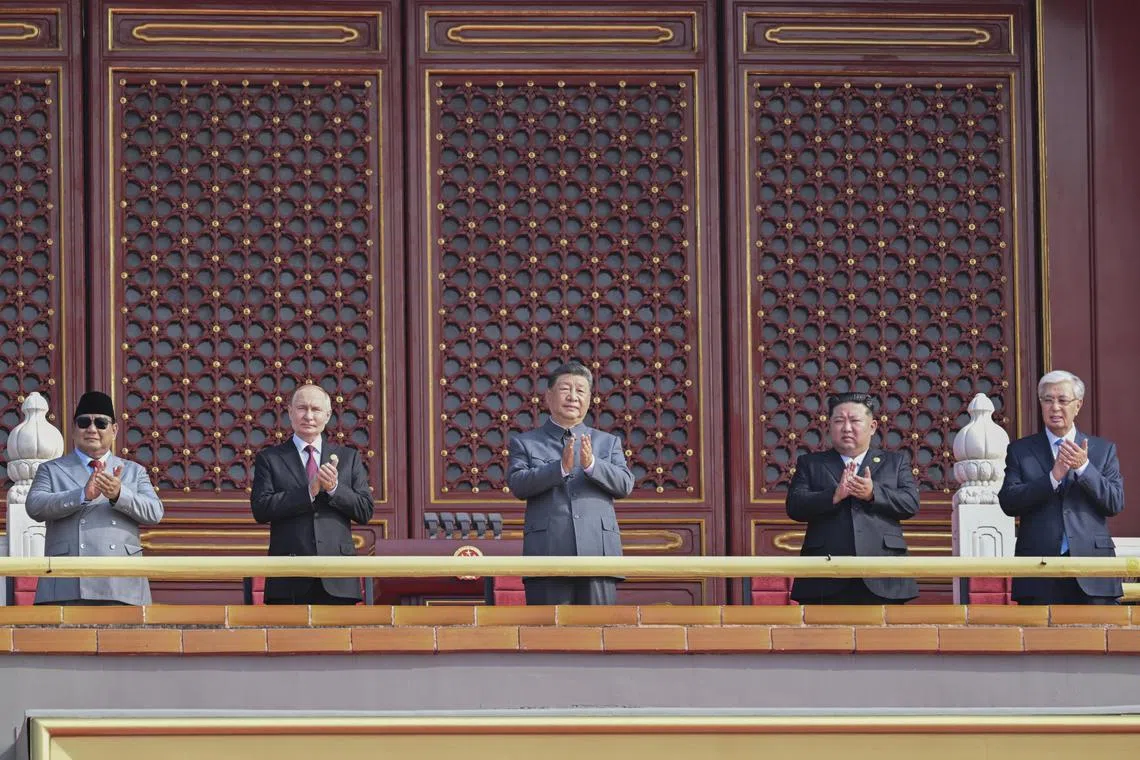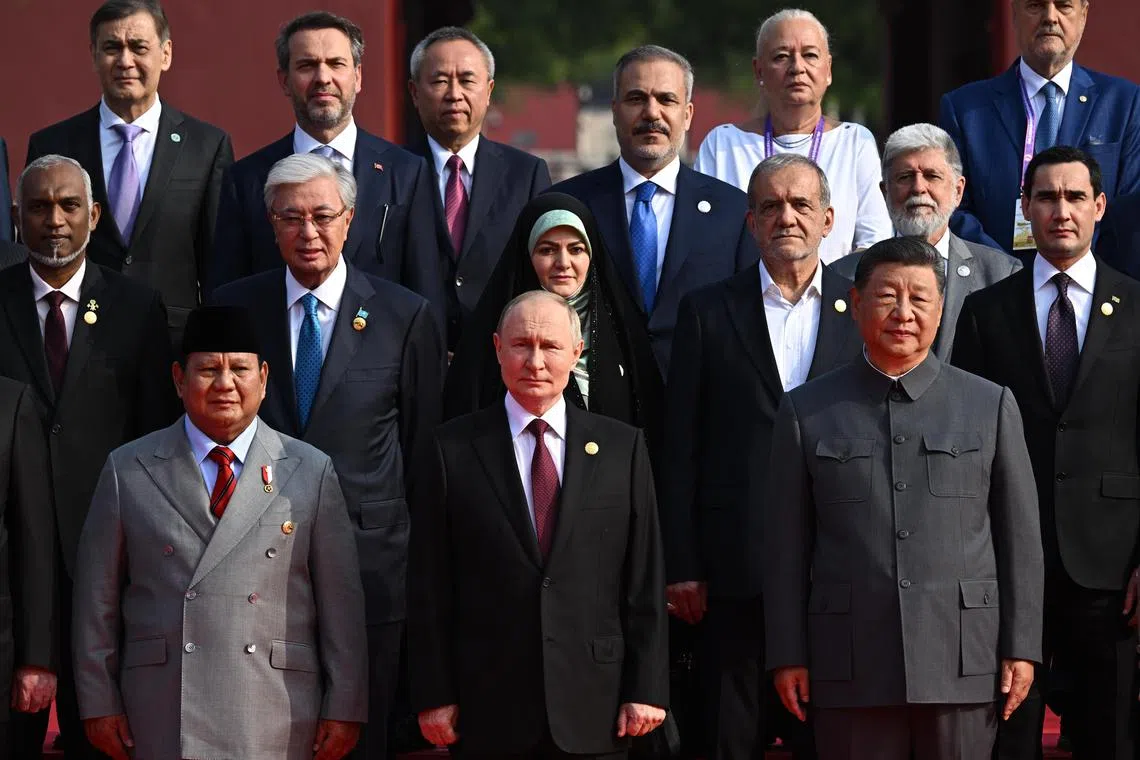News analysis
Prabowo in the frame with China and allies – prestige or peril?
Sign up now: Get insights on Asia's fast-moving developments

(From left) Indonesian President Prabowo Subianto, Russian President Vladimir Putin, Chinese President Xi Jinping, North Korean leader Kim Jong Un and Kazakhstan President Kassym-Jomart Tokayev at a military parade on Sept 3.
PHOTO: EPA
Follow topic:
JAKARTA – Indonesian President Prabowo Subianto was photographed alongside Chinese President Xi Jinping, Russian President Vladimir Putin and North Korean leader Kim Jong Un in a striking image taken at Tiananmen Square that thrust him into the global spotlight.
Analysts said the photo-op, largely symbolic, projected Mr Prabowo’s alignment and influence alongside some of the world’s most powerful leaders, even if it carried little immediate policy weight.
The Sept 3 military parade, marking 80 years since Japan’s defeat in World War II,
For Mr Prabowo, the visit was brief but high-profile. He arrived with a small entourage, stayed for less than eight hours, and had skipped the Shanghai Cooperation Organisation (SCO) summit in Tianjin three days earlier because of deadly protests at home.
Jakarta said he eventually attended the parade at the “very strong request” of Beijing, underscoring Indonesia’s rising visibility in multilateral forums even amid domestic unrest.
“This picture is unique. It shows that (Indonesia, China, Russia and North Korea) share many traits,” Associate Professor Teuku Rezasyah of Padjadjaran University and President University told The Straits Times.
Their similarities, he noted, include awareness of a global power shift from the US to China and sensitivity to the importance of international groupings like Brics, as well as events such as the SCO, both of which require close coordination among state leaders.
The image hinted at Indonesia’s potential role in regional security. Mr Prabowo’s attendance provided an opportunity to strengthen ties with Mr Kim. The picture also sent a message of support from Russia and China to Indonesia to help stabilise the Korean peninsula, Prof Rezasyah said. Even if symbolic, it projected Indonesia’s ability to move beyond bilateral diplomacy and engage in broader security dialogues.
Although the Chinese state media edited Mr Prabowo out of some coverage, Prof Rezasyah said the impact of his visit remained. “For Prabowo, it does not matter, as his visit has already become a significant part of the event.”
High visibility, higher risks
The parade not only thrust Mr Prabowo into the international spotlight but also intensified scrutiny from Washington. Economic pushback was one risk. A more confrontational White House could impose tariffs or discourage investment, raising Indonesia’s risk premium in global markets.
“Of course, the US will openly criticise Indonesia, (which may come down to) partially withdrawing investment and putting Indonesia at a higher country risk level,” Prof Rezasyah said.
Associate Professor Yohanes Sulaiman of Jenderal Achmad Yani University warned of possible diplomatic fallout. “Trump was seething, and frankly at this point, I am not sure what he will do. But this is a signal that China has the upper hand in the battle for hearts and minds of the Global South, supported by China’s traditional allies Russia and North Korea,” he told ST.
But he also noted that the heads of a number of the world’s most populous countries, including Indonesia, India and Brazil, were in China for its prominent events. This, he suggested, was a deliberate signal to Mr Trump and the West that China is asserting itself as the new leader on the global stage, with many nations willing to publicly support its claim.

(Front row, from left) Indonesian President Prabowo Subianto, Russian President Vladimir Putin and Chinese President Xi Jinping at a military parade at Tiananmen Square in Beijing on Sept 3.
PHOTO: EPA
Mr Muhammad Habib Abiyan Dzakwan, a researcher at the Centre for Strategic and International Studies in Indonesia, urged caution. American foreign policy, including its relationship with China, he said, should not be seen as always predictable or consistent.
He also stressed that Indonesia was not alone in attending the parade. “Almost all Asean countries sent leaders or senior officials,” he said. “Up to this point, I think it might give President Trump one more reason to impose additional tariffs or cancel the existing deal, but given his immediate response to the military parade, I do not see Trump riding on the momentum.”
Mr Trump has not taken any official action in response to the parade, limiting his moves to public remarks. On Sept 3 at the White House, he described the display as “very, very impressive” and said: “They were hoping I was watching, and I was watching. My relationship with all of them is very good. We are going to find out how good it is over the next week or two.”
Mr Habib also questioned the Indonesian government’s non-alignment strategy. “It does not fit with Indonesia’s overall balancing strategy – if the current administration even has one in the very first place,” he said.
He added that the country’s balancing act should not be limited to great power rivalry.
“In recent cases, Indonesian leaders seem to forget that Indonesia’s balancing posture cannot be confined to great power competition alone. A genuinely balanced view and posture are also required in other situations, including differences between neighbours such as China and Japan, or China and the Philippines,” he said.
Projecting power and prestige
For Beijing, Indonesia’s presence added symbolic weight, reinforcing China’s claim to be rallying support from key partners in South-east Asia. For Mr Prabowo, the appearance was less about military spectacle than about signalling that Indonesia could stand shoulder to shoulder with the world’s most uncompromising leaders.
Military parades, said Mr Habib, seem to align closely with Mr Prabowo’s identity as a retired army general and former defence minister. Prof Rezasyah said the visit reflected Mr Prabowo’s pragmatism and idealism, as well as his ability to balance domestic and international affairs. “It also proved his capacity as a credible statesman,” he said.
Other analysts saw personal motives. “This is more of an ego trip. He claimed that there is a strong request from the Chinese government for him to attend at least for a day, which implied that they begged him to come. He wanted to be perceived as one of the ‘big leaders’ – a big player whom everyone respects,” said Prof Yohanes.
Moreover, the timing was sensitive. Deadly protests had just rocked Indonesia,
“Prabowo’s visit represents his capacity to prevent a greater crisis a la the May 1998 sad story,” Prof Rezasyah said.
The Tiananmen image of the four leaders was, in the end, a calculated show. For Mr Prabowo, it underscored Indonesia’s growing diplomatic weight, but also its delicate balancing act between domestic stability and global engagement.
Asked if the trip was worth the risks, Prof Rezasyah said: “It depends on Prabowo’s leadership and managerial capacities, to convince Beijing and Washington that Indonesia will remain neutral and never take sides in their rivalries.”


